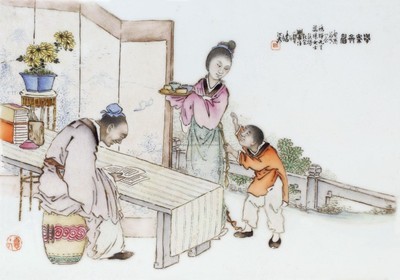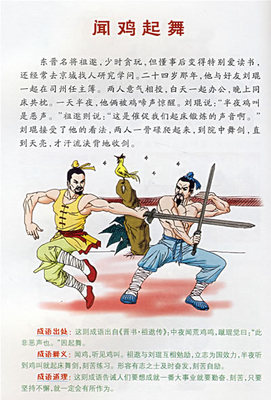
本周典故:举案齐眉
Today I am going to translate the allusion known as:“husband and wife treating each other withcourtesy”
1、文言文原文:
梁鸿字①伯鸾,扶风平陵人。势家慕其高节,多欲女之,鸿并绝不娶。同县孟氏有女,状肥丑而黑,力举石臼,择对不嫁,至年三十。父母问其故,女曰:“欲得贤如梁伯鸾者。”鸿闻而聘之。女求作布衣、麻屦,织作筐缉绩之具。及嫁,始以装饰入门,七日而鸿不答。妻乃跪床下,请曰:“窃闻夫子高义,简斥数妇。妾亦偃蹇数夫矣,今而见择,敢不请罪。”鸿曰:“吾欲裘褐之人,可与俱隐深山者尔,今乃衣绮缟,傅粉墨,岂鸿所愿哉!”妻曰:“以观夫子之志耳。妾亦有隐居之服。”乃更为椎髻,著布衣,操作而前。鸿大喜曰:“此真梁鸿妻也,能奉我矣。”字之曰德耀,名孟光。......遂至吴,依大家皋伯通,居庑下,为人赁舂。每归,妻为具食,不敢于鸿前仰视,举案齐眉。
------摘自《后汉书·梁鸿传》
注释:① “男子二十冠而字,女子十五笄而字”(《礼记·曲礼》),“字”只是限于古代有身份的人。不管男女,只有到了成年才取字,取字的目的是为了让人尊重他,供他人称呼。一般人尤其是同辈和属下只许称尊长的字而不能直呼其名。字与名有密切关系,字往往是名的补充或解释,这叫“名字相应”,互为表里,故字又称作“表字”。古人命字方法的主要依据有以下几种:①同义反复。如:如屈原名平,字原,广平为原。梁鸿,字伯鸾。鸾和鸿都是飞禽,但不是一种,鸿雁和鸾凤可以互为辅助。②反义相对。如:赵孟頫,字子昂③连义推想。如:杨过,表字改之。
2、现代汉语
梁鸿字伯鸾,是扶风平陵人(今山陕西咸阳西北)。由于梁鸿的高尚品德,许多有钱有势的人家都想把女儿嫁给他,梁鸿却一并谢绝他们的好意,就是不娶。与他同县的一位孟氏有一个女儿,长得又黑又肥又丑,而且力气极大,能把石臼轻易举起来。每次为她择婆家,就是不嫁,已三十岁了。父母问她为何不嫁。她说:“我要嫁象梁伯鸾一样贤德的人。梁鸿听说后,就下娉礼,准备娶她。
孟女高高兴兴的准备著,买麻布缝制嫁妆。等到过门那天,她打扮得漂漂亮亮的。哪想到,婚后一连七日,梁鸿一言不发。孟家女就来到梁鸿面前跪下,说:“妾早闻夫君贤名,立誓非您莫嫁;夫君也拒绝了许多家的提亲,最后选定了妾为妻。可不知为什么,婚后,夫君默默无语,不知妾犯了什么过失?”梁鸿答道:“我一直希望自己的妻子是位能穿麻葛衣,并能与我一起隐居到深山老林中的人。而现在你却穿著绮缟等名贵的丝织品缝制的衣服,涂脂抹粉、梳妆打扮,这哪里是我理想中的妻子啊?”
孟女听了,对梁鸿说:“我这些日子的穿著打扮,只是想验证一下,夫君你是否真是我理想中的贤士。妾早就准备有劳作的服装与用品。”说完,便将头发卷成髻,穿上粗布衣,架起织机,动手织布。梁鸿见状,大喜,连忙走过去,对妻子说:“你才是我梁鸿的妻子!”他为妻子取名为孟光,字德曜,意思是她的仁德如同光芒般闪耀。
后来他们一道去了霸陵(今西安市东北)山中,过起了隐居生活。在霸陵山深处,他们以耕织为业,或咏诗书,或弹琴自娱。
不久,梁鸿为避征召他入京的官吏,夫妻二人离开了齐鲁,到了吴地(今苏州)。梁鸿一家住在大族皋伯通家宅的廊下小屋中,靠给人舂米过活。每次归家时,孟光备好食物,低头不敢仰视,举案齐眉。
“举案齐眉”后多指夫妻互相尊敬,礼貌互待,相敬如宾。又作“比案齐眉”,与之近义的词有相敬如宾(《左传》)、琴瑟和鸣(《诗经》)等。
3、English Translation
Liang Hong, with the courtesy name of Bo Luan, was bornin Ping Ling, Fu Feng, a town in the Northwest of Shanxi Province.Known for his noble qualities, he was the ideal husband or son-inlaw in the town. Many families, rich in wealth or powerful inpolitics, were willing to marry their daughter to him. To theirsurprise, Liang Hong declined all of those proposals. Living in thesame town, The Mengs had onestout daughter whowascharnus in size and black in skin color. Shewas so strong in strength that she could lift up the stone mortarby hand. However, whenever her parents invited the matchmakers tointroduce her ideal husband, she would always reply with refusal.Their parents became worried as she was almost 30 years old, at theage of which most of the girls would have already got married inancient China. "I would marry nobody but the one who was as nobleas Bo Luan", she said to her worried parents. Hearing of this,Liang Hong got the betrothal gift prepared, ready to marryher.
With great joy, Miss Meng set about preparing thetrousseaux on her part. She invited the flax dressers to makewedding cloth for her. The day they got married, she dressed upgloriously. Out of her expectation, Liang Hong kept silent aftertheir marriage for as long as seven days. So anxious as she was,she kneeled down in front of Liang Hong, and said: "I’ve heard thatyou’re noble, and that’s why I vowed to marry nobody but you. Onyour part, you had declined many marriage proposals before takingme as your wife. In this case, your silence after our wedding is soconfusing that I can’t help to wondering if there was anything thatI’ve done wrong?" "I'm looking for someone who will be willing towear rug clothes and live as hermits with me in the remote andthickly forested mountains. Yet you’re now wearing in luxurioussilk clothes, cosmetically dressed up with powder, how on earth canyou be my ideal wife?" replied Liang Hong.
Onhearing this, Miss Meng said, "I’m wearing these clothes to checkwhether you’re the truly ideal distinguished man in my mind. I haveprepared myself clothes and stuff for hardlabor." Finished those words, she bobbed herhair, put on her coarse clothes, set up the loom, and began to makethe cloth. Seeing this, Liang Hong was so pleasant that he wenttowards his wife and said, "you are exactly the wife I want". Henamed his wife"Meng Guang" , with the courtesyname "De Yao" which means glorious with virtue and kindness.
Later, they retreated together in the Ba Lin Hill, a hillin the northeast of Xi’an, lived on farming andweaving, and entertained themselves by reading poetry or playingmusic.
Before long, in order to avoid the disturb of beingmustered in as an government officer in the capital city, thecouple left Qi Lu for Wu, which is know as Suzhounowadays. They rented a small house in the luxurious mansion of thedistinguished family Gao Botong, and lived on rice-husking for thefamily. Each time when Liang Hong came back home, Meng Guang wouldget the food ready in the tray, lift the tray as high as hereyebrow, and lower her head rather than look up into the face ofLiang Hong to show her great respect tohim.
----------------Translated from The Book ofDong-Han
Later on, people take "lifting the tray as high as the wife’s eyebrow" as an allusion to express the meaning that "husband and wife treating each other with courtesy." Synonyms most frequently used in Chinese allusions are "husband and wife respect each other as if they are guests of the family" (Legend of Spring and Autumn Century by Zuo Qiuming) and "The lute and psaltery are in harmony"(The Song of Poetry) to allude the felicity of husband and wife.
4、典故点评及应用举例
古人对夫妻之间界定的关系是“床上是夫妻,床下是君子”。夫为君,妻为子。古代妇女称丈夫为“夫君”,做妻子的自称为“妾”,“奴婢”,“卑妾”,丈夫则对妻子称“贱人”,“贱内”,“拙荆”“糟糠”。这是中国几千年儒家文化孽生出来的夫妻行为准则。在特定的历史阶段,在以男权为基础的封建社会里,自有它存在的合理性。它的影响是深远的。受儒家文化的深刻影响,男尊女卑的思想渗透到东方文化的深层里去。我们可以从现在日本和韩国的电视电影里临摹到这种文化的根深蒂固。日本和韩国的妇女在家庭中程序化的循规蹈矩的生活方式,正是对相敬如宾和举案齐眉最立体的注解。直到如今,人们在衡量女人的“德”时仍然把“贤妻良母”做为最优的评价,“相夫教子”也是古代妇女的本职。
夫妻之间要不要敬重对方,尊重对方,相互敬重,答案是肯定的。但若我们想象这个场景,女的跪在那里,把案举至眉高,毕恭毕敬的样子,不像夫妻,是皇权与臣子,是主人与仆人。夫妻两个,见了对方,总像见了客人一样那么彬彬有礼,总像客人一样那么敬着,这样的夫妻生活一定是枯燥的,一定是缺乏生命和活力的。不管举案齐眉还是相敬如宾,从本质来说,符合古代男尊女卑的时代特征。
“纵然是举案齐眉,到底意难平”(《红楼梦》)现在中央提倡建立和谐社会,社会和谐离不开家庭的和谐,夫妻之间的和谐,但我们不希望是那种“相敬如宾和举案齐眉”的和谐。写到这里,不觉又想到一个成语,叫“琴瑟和鸣”,亦作“琴瑟和好”“琴瑟和同” “琴瑟相调” “琴瑟调和”。
《诗经·周南·关雎》有曰:“窈窕淑女,琴瑟友之。”。此典用得颇多,如:“结同心尽了今生,琴瑟和谐,鸾凤和鸣。”(元徐琰《青楼十咏言盟》),“夫妻和顺从今定,这段姻缘夙世成,琴瑟和谐乐万春。”(沈受先《三元记团圆》),“孙由是琴瑟和好。生一男两女,十余年从无角口之事。”(《聊斋志异孙生》),“愿心儿折桂乘龙,怎能勾鱼水相逢,琴瑟和同。”(《群音类选<诸腔类点绛唇>》),“妻子好合,如鼓琴瑟。”(《诗经 ·小雅· 棠棣》) ,“今日也鱼水和谐,燕莺成对,琴瑟相调。”(元王子一《误入桃源》四折),“琴瑟相调,芝兰又吐,三迁慈教推贤母。”(明汪廷讷《狮吼记 抚儿》),“琴瑟调和,百年相聚。”(《群音类选<玉钗记桂亭赏月> 》)
由此可见,相敬如宾、举案齐眉不如琴瑟和鸣更贴切。不过,举案齐眉仅仅告诉人们一种精神,告诉人们生活的一种态度,生活在人群中,举止言辞是一种生活的艺术,是一种修养的体现。夫妻之间亦然。
 爱华网
爱华网

